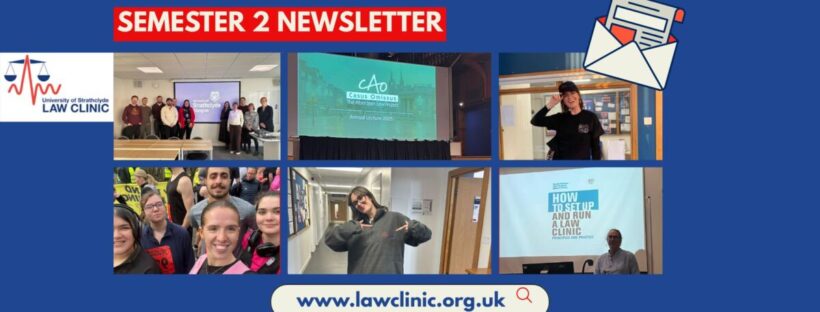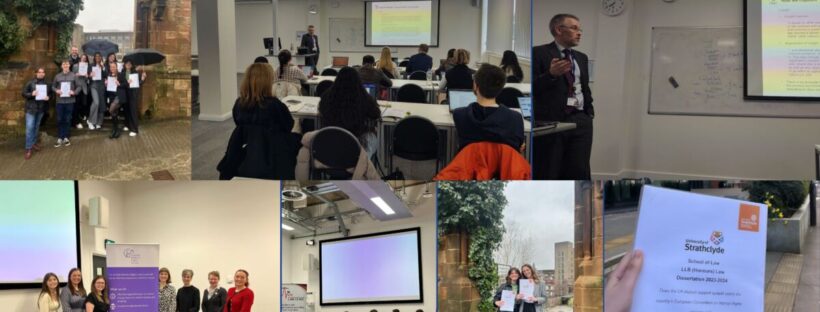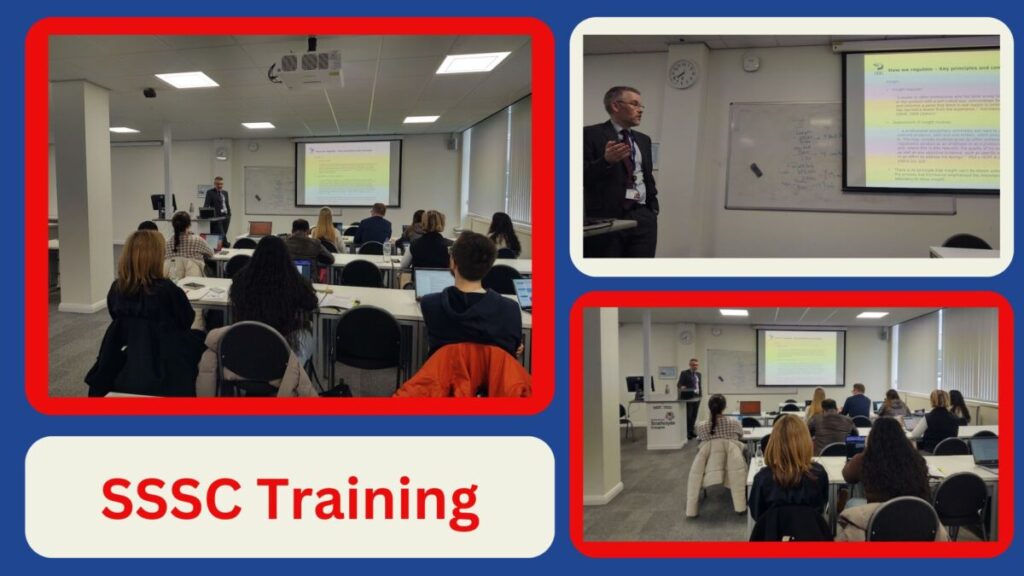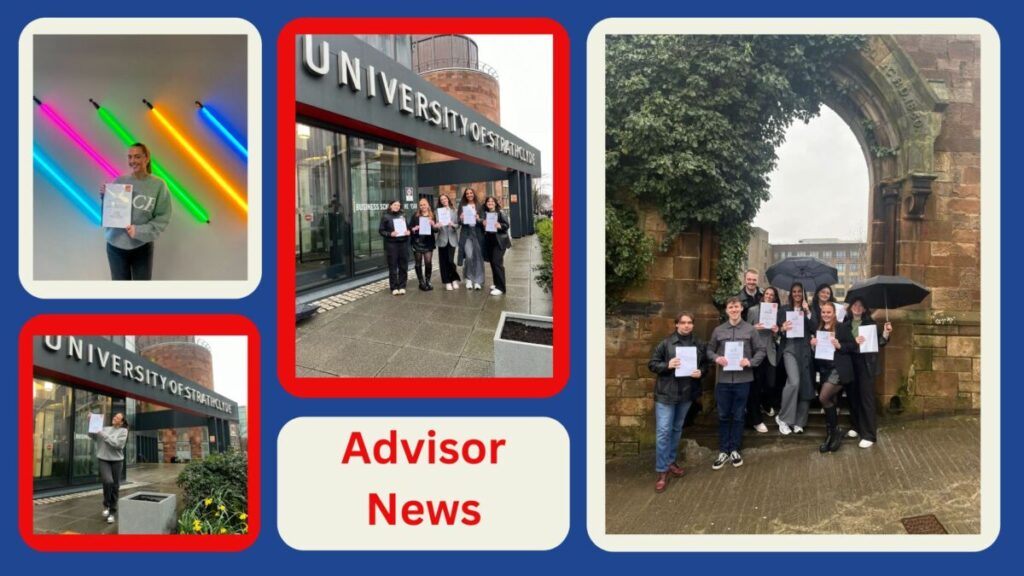Recruitment
This semester, we were thrilled to welcome two additions to our staff: Claudia Hoey and Alison Duncan. Both will be supporting our Housing Law caseload, which we know has been expanding in recent years. Claudia joined in January as our Housing Case Supervisor, and will be working alongside Alison Duncan who joined in February as a part-time Housing Administrator. Alison has been a valued Student Advisor since 2023, and we are thrilled to see her progressing in this new role. We wish them both every success in their new roles!
Training
This semester our training team have offered a number of exciting training opportunities for our students:
Imposter syndrome
We were also fortunate enough to welcome alumni of the Clinic John Stringer and his team from Keoghs to deliver a session on Imposter Syndrome at the start of 2025. This interactive session was well attended by Advisors who appreciated the openness of John and his colleagues. They shared their experiences of Imposter Syndrome as well as ways they’ve overcome this. As Advisors in the Clinic, it easy to feel “out of your depth” and it was refreshing to be able to put such feelings in perspective and understand all lawyers deal with such problems.
Conveyancing (in collaboration with Strathclyde Law Society)
Our alumni continued to deliver for us – and we were delighted to welcome Kristy Fyfe back to the Clinic to give us an introduction to Conveyancing. As we’ve recently welcomed a dedicated Housing solicitor to our team Kristy was on hand to delve into all areas Housing as well as share her path from Advisor to Solicitor. The specialised nature of this session meant it wasn’t as well attended as we hoped for.
SWRC Training
The SWRC extended an invitation to students of the Strathclyde Law Clinic to their training day which aimed to equip legal professionals with a knowledge and understanding of the issues surrounding domestic abuse and how to approach survivors of domestic abuse in their practice. One of our SWRC volunteers who attended the training day detailed their experience in the following article: https://www.lawclinic.org.uk/updates/swrc-domestic-abuse-training-day-reflections-and-key-takeaways
Legal Aid Crisis
In response to the Legal Aid Crisis, we formed a working group to formulate a response. As an organisation that bridges an essential gap between those who qualify for legal aid and can afford legal representation, we are seeing an increasing number of enquiries as more and more people in Scotland fall into this category. As such, it was important for many of us to respond. We pulled together a working group of volunteers and worked together to produce an article covering the impact of the crisis on our services, as well as contributing to a Scottish Government Consultation. You can read that contribution below: https://yourviews.parliament.scot/ehrcj/legal-aid-inquiry/consultation/view_respondent?uuId=364891569 and the article prepared by our working group of volunteers, here: https://www.lawclinic.org.uk/updates/the-scottish-legal-aid-crisis-strathclyde-law-clinic-students-share-their-perspectives
Events
Citizens Advice Collaboration
We welcomed a number of members of Citizens Advice Scotland to our clinic in January this year. The aim of this exchange was to learn more about the services provided by each organisation, and explore potential collaborations. You can read more about this exchange via the below article: https://www.lawclinic.org.uk/updates/strathclyde-law-clinic-and-citizens-advice-bureau-cab-strengthening-connections
Donald Nicolson’s book event
We were thrilled to welcome back our Founder, Professor Donald Nicolson, to the university to celebrate his recent book launch: How to Set up and Run a Law Clinic: Principles and Practice. The evening included a talk from Professor Nicolson, as well as an opportunity to catch up with colleagues and exchange ideas! You can read more on the content discussed through reading the article below: https://www.lawclinic.org.uk/updates/donald-nicholson-book-event
Visit from Swedish Students
In early March, a team of staff and students from the Forensic Psychology Department in Stockholm made a field trip to Scotland to visit and learn from organisations working on law and crime in different settings. In particular the group were interested in access-to-justice, miscarriages of justice, and the fallibility of legal systems.
Rowan Brockie, Daniel Johnston Faustino and Freya Sneddon volunteered to speak to the group about their experiences of working with the law clinic’s partner organisation, the Miscarriages of Justice Organisation (MOJO). All three spoke passionately and engagingly about their work and how they balance the challenges that arise from working on difficult cases with the rewards of making a difference for clients who would not otherwise have a voice. The visiting professor said afterwards to say how impressed she was by their knowledge and dedication to this important work.
ALP Lecture
Corey Beaton, one of this year’s Student Directors, attended the Aberdeen Annual Law Project’s Lecture at the Aberdeen Law Project in March of this year. He detailed his experience in the following article: https://www.lawclinic.org.uk/updates/aberdeen-law-project-annual-lecture
International Women’s Day
This year we celebrated International Women’s Day with our colleagues at the SWRC with an online discussion, lead by Lindsay Fleming, SWRC Senior Associate from JustRight LLP. The online event was attended by many students, including Lauren Weetman, who detailed the event in the following article: https://www.justrightscotland.org.uk/2025/03/celebrating-international-womens-day-with-student-volunteers-from-the-university-of-strathclyde-law-clinic/
Furthermore, our SWRC Volunteers took the opportunity to reflect on their time working with the organisation and the important issues and themes they have come across in doing this work. You can read these thoughts via the article below: https://www.lawclinic.org.uk/updates/iwd-2025-hear-from-our-swrc-volunteers
New Clinic Merchandise

Fundraising Efforts:
A number of our student advisors participated in the Kelvingrove 10k in March this year to raise funds for the clinic. Those student advisors were: Natalie Marshall, Saeed Azodazad, Murron McManus, Freya Sneddon and Harbani Kohli. The group has raised over £400! A massive thank you to all who participated and donated!
We also successfully applied for a grant from the Blue Moon Trust, who very generously donated £10,000 to our work. We owe a big thank you to them and to Eddie Thomas, who introduced the clinic to the Trust.
In other fundraising news, two of our student advisors and exec committee members, Megan Buggy and Abbie Clark, ran the Barcelona Half Marathon raising over £1,200 for Alzheimer’s charities in the UK. The pair carried out their training and run during their year’s abroad, studying in Valencia and Toulouse, respectively, whilst keeping up their executive committee roles. They would like to extend a big thank you to everyone in the clinic community who donated!
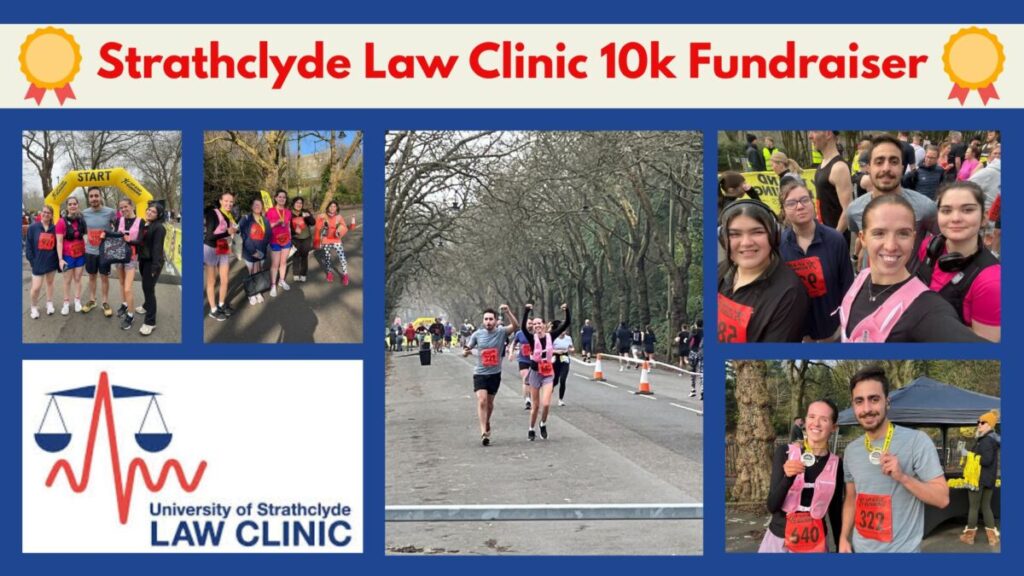
Advisors of the Month
January:
- Firm A – Alec Hudson
- Firm B – Romy Gilgallon
- Firm C – Isaac Frew
- Firm D – Abby Grace McKay
- Firm E – Areesa Aslam
- Online Project – Daniel Johnson Faustino
- IAC – Daniel Johnson Faustino
February:
- Firm A – Nick Murray
- Firm B – Freya Sneddon
- Firm C – Romy Gilgallon
- Firm D – Basmah Hussain
- Firm E – Ailsa McAleavey
- Online Project – Daniel Lee
- IAC – Nick Murray
March
- Firm A – Grace Rhode
- Firm B – Rowan Brockie
- Firm C – Hamaad Anwar
- Firm D – Murron McManus
- Firm E – Max Huthwaite
- Online Project – Mia Presslie
- IAC – Ryan Gray
May:
- Firm A – Alison Duncan
- Firm B – Ailie Wright
- Firm C – Morgan Barnes
- Firm D – Megan Wales
- Firm E – Laura Nicol
- Online Project – Emira Attia
- IAC – Daniel Lee
New Executive Committee (2025/26)
We have successfully recruited a new cohort of executive committee members for 2025/26…
Student Directors: Gordon Gow and Hannah Stewart
Firm Coordinators: Jess Jayan, Afton Cook, Hamaad Anwar, Tharana Anwar and Saeed Azodazad
Online Project Coordinator: Megan Buggy
Deputy Online Project Coordinator: Emira Attia
Initial Advice Clinic Coordinator: Harbani Kohli
Deputy IAC Coordinators: Ryan Gray and Murron McManus
Public Legal Education Project Coordinator: Abbie Clark
Deputy PLE Project Coordinator: Freya Sneddon
Criminal Appeals Unit Coordinator: Rowan Brockie
The Asylum Project coordinator: Anna Ciliento
Deputy TAP Coordinator: Godwin Kangni-Soukpe
Equality, Diversity, & Inclusion officer: Allana Williams
Environmental Justice Project Coordinator: Dylan Wright
Deputy Environmental Justice Project Coordinator: Emma Campbell and Callum Robertson
Fundraising Officer: Daniel Johnson Faustino
Communications Team:
Ailie Wright, Lily Colquhoun and Basmah Hussain
Training Officer: Abby MacKay
We would like to take this opportunity to extend our heartfelt gratitude and well wishes to our 2024/25 Executive Committee members for their hard work and dedication over the past year.
Links to Semester 2 Articles:
From Strathclyde to Norway: My Semester Abroad Experience
Strathclyde Law Clinic and Citizens Advice Bureau (CAB): Strengthening Connections
EJP Update: UN Special Rapporteur on Climate Change & Human Rights
Beyond Providing Access to Justice: Why I Believe the Law Clinic Advances Social Mobility
SWRC Domestic Abuse Training Day: Reflections and Key Takeaways
IWD 2025: Hear from our SWRC Volunteers
Donald Nicolson Book Event: Highlights and Lessons from the Evening
Environmental Justice Project 2024/25
What to expect from an Initial Interview
Aberdeen Law Project Annual Lecture
The Scottish Legal Aid Crisis: Strathclyde Law Clinic students share their perspectives
